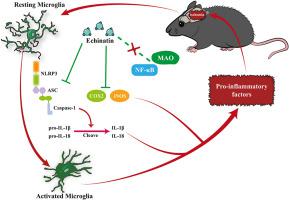当前位置:
X-MOL 学术
›
Neurochem. Int.
›
论文详情
Our official English website, www.x-mol.net, welcomes your feedback! (Note: you will need to create a separate account there.)
Echinatin protects from ischemic brain injury by attenuating NLRP3-related neuroinflammation
Neurochemistry international ( IF 4.2 ) Pub Date : 2024-02-07 , DOI: 10.1016/j.neuint.2024.105676 Liang Sun , Duo Chen , Chenchen Zhao , Yujie Hu , Yuhao Xu , Shengnan Xia , Haiyan Yang , Xinyu Bao , Zhi Zhang , Chao Zhou , Qingxiu Zhang , Yun Xu
Neurochemistry international ( IF 4.2 ) Pub Date : 2024-02-07 , DOI: 10.1016/j.neuint.2024.105676 Liang Sun , Duo Chen , Chenchen Zhao , Yujie Hu , Yuhao Xu , Shengnan Xia , Haiyan Yang , Xinyu Bao , Zhi Zhang , Chao Zhou , Qingxiu Zhang , Yun Xu

|
Microglia-mediated neuroinflammation is the major contributor to the secondary brain injury of ischemic stroke. NLRP3 is one of the major components of ischemia-induced microglial activation. Echinatin, a chalcone found in licorice, was reported to have the activity of anti-inflammation and antioxidant. However, the relative study of echinatin in microglia or ischemic stroke is still unclear. We intravenously injected echinatin or vehicle into adult ischemic male C57/BL6J mice induced by 60-min transient middle cerebral artery occlusion (tMCAO). The intraperitoneal injection was performed 4.5 h after reperfusion and then daily for 2 more days. Infarct size, blood brain barrier (BBB) leakage, neurobehavioral tests, and microglial-mediated inflammatory reaction were examined to assess the outcomes of echinatin treatment. LPS and LPS/ATP stimulation on primary microglia were used to explore the underlying anti-inflammatory mechanism of echinatin. Echinatin treatment efficiently decreased the infarct size, alleviated blood brain barrier (BBB) damage, suppressed microglial activation, reduced the production of inflammatory factors (e.g., IL-1β, IL-6, IL-18, TNF-α, iNOS, COX2), and relieved post-stroke neurological defects in tMCAO mice. Mechanistically, we found that echinatin could suppress the NLRP3 assembly and reduce the production of inflammatory mediators independently of NF-κB and monoamine oxidase (MAO). Based on our study, we have identified echinatin as a promising therapeutic strategy for the treatment of ischemic stroke.
中文翻译:

松果素通过减轻 NLRP3 相关的神经炎症来预防缺血性脑损伤
小胶质细胞介导的神经炎症是缺血性中风继发性脑损伤的主要原因。 NLRP3 是缺血诱导的小胶质细胞激活的主要成分之一。 Echinatin 是甘草中发现的一种查尔酮,据报道具有抗炎和抗氧化活性。然而,松果素在小胶质细胞或缺血性脑卒中中的相关研究尚不清楚。我们将紫锥菊素或载体静脉注射到由 60 分钟短暂大脑中动脉闭塞 (tMCAO) 诱导的成年缺血性雄性 C57/BL6J 小鼠中。再灌注后4.5小时进行腹膜内注射,然后每天进行腹膜内注射,持续2天。检查梗塞面积、血脑屏障(BBB)渗漏、神经行为测试和小胶质细胞介导的炎症反应,以评估松果素治疗的结果。 LPS 和 LPS/ATP 对原代小胶质细胞的刺激被用来探索松果素的潜在抗炎机制。紫锥菊素治疗可有效减少梗塞面积,减轻血脑屏障 (BBB) 损伤,抑制小胶质细胞活化,减少炎症因子(例如 IL-1β、IL-6、IL-18、TNF-α、iNOS、COX2)的产生,并缓解 tMCAO 小鼠的中风后神经缺陷。从机制上讲,我们发现紫锥菊素可以独立于 NF-κB 和单胺氧化酶 (MAO) 抑制 NLRP3 组装并减少炎症介质的产生。根据我们的研究,我们确定松果体素是治疗缺血性中风的一种有前途的治疗策略。
更新日期:2024-02-07
中文翻译:

松果素通过减轻 NLRP3 相关的神经炎症来预防缺血性脑损伤
小胶质细胞介导的神经炎症是缺血性中风继发性脑损伤的主要原因。 NLRP3 是缺血诱导的小胶质细胞激活的主要成分之一。 Echinatin 是甘草中发现的一种查尔酮,据报道具有抗炎和抗氧化活性。然而,松果素在小胶质细胞或缺血性脑卒中中的相关研究尚不清楚。我们将紫锥菊素或载体静脉注射到由 60 分钟短暂大脑中动脉闭塞 (tMCAO) 诱导的成年缺血性雄性 C57/BL6J 小鼠中。再灌注后4.5小时进行腹膜内注射,然后每天进行腹膜内注射,持续2天。检查梗塞面积、血脑屏障(BBB)渗漏、神经行为测试和小胶质细胞介导的炎症反应,以评估松果素治疗的结果。 LPS 和 LPS/ATP 对原代小胶质细胞的刺激被用来探索松果素的潜在抗炎机制。紫锥菊素治疗可有效减少梗塞面积,减轻血脑屏障 (BBB) 损伤,抑制小胶质细胞活化,减少炎症因子(例如 IL-1β、IL-6、IL-18、TNF-α、iNOS、COX2)的产生,并缓解 tMCAO 小鼠的中风后神经缺陷。从机制上讲,我们发现紫锥菊素可以独立于 NF-κB 和单胺氧化酶 (MAO) 抑制 NLRP3 组装并减少炎症介质的产生。根据我们的研究,我们确定松果体素是治疗缺血性中风的一种有前途的治疗策略。



























 京公网安备 11010802027423号
京公网安备 11010802027423号